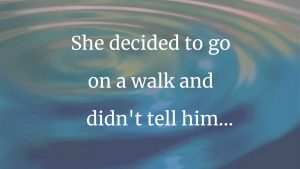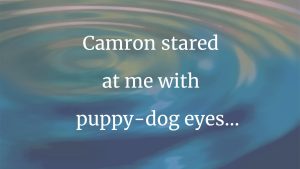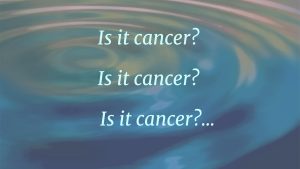“He basically killed me,” Sam said flatly, sitting my office. “I don’t want to talk to him.”
I nodded sadly with understanding as his on-demand oxygen hissed away each moment, like the ticking of a clock. Why would a patient want to speak to a doctor who’d missed his diagnosis? Why should he?
I listened as this lively and tender man who’d been referred to me for palliative care. His body swimming in clothes that were now three sizes too big, he told me about his planned retirement trip of a lifetime. It was a trip he would not be taking. He couldn’t imagine traveling weakly, timidly, in a wheelchair.
“You can’t tell now, but I was a foodie. I was going to Bourdain the hell out of it.” His oxygen tubing snaked around the back of his wheelchair to where the tanks sat, like ballast.
Until two weeks ago, Sam had been convinced that his increasing hip pain was arthritis. “Every other joint was wearing out, so why not that too?” But then he’d misjudged the end of a flight of stairs and had fallen down. Hard. The pain had been excruciating as he waited, unable to move, for his partner to return home.
He had known the news wasn’t good when the ER physician took the time to close the door after entering his room. “I have some bad news,” the doctor had said quietly. “You have a hip fracture, and it looks like your cancer has spread.”
“My cancer?”
Five months prior, Sam had gone to see a physician because he felt short of breath. The chest X- ray confirmed that he had pneumonia, but there was also a “concerning mass.” This mass was documented in the full findings section of the radiological report, but was unintentionally left out of the final impressions.
In general, radiology reports have two parts: a longer section that contains the full findings of the study, and a shorter “final impressions” section that summarizes the most important details for the healthcare providers. Depending on the circumstances, a physician might only review the summary, and this is what Sam’s physician had done.
In Sam’s medical chart, underneath the radiologist’s order for a follow-up chest CT, were two words: “No Show.”
Sam hadn’t been told about the mass. He hadn’t known. The doctor had simply treated Sam’s pneumonia.
“People keep talking about it like it was a spelling error. He should have read the whole report. It’s his job,” Sam said through gritted teeth. “It’s his job.”
The doctor, a highly respected physician nearing retirement himself, had called me ahead of my visit with Sam.
“I’ve never missed anything like this,” he said quietly, his voice rough with emotion. “Ever. I’ve been in medicine for over three decades.” I heard his hand moving to cover the receiver. His sobs were muffled, but audible.
I sat stunned. What words could possibly soothe this pain? I could feel a flush of uncertainty creep up my neck. It was an outcome that every clinician fears. Making a mistake. Making a devastating mistake.
He had missed just a few words. Words that were not in the right place, overlooked amid the setting of a chaotic clinic, while his partner was on vacation, and he was taking extra call.
Listening, I had the sense that his mind had already begun to redefine his long and successful career. His mind told him that he was a failure. That he was not a good doctor.
“I don’t know how to make this right,” he said. “I don’t know if I can continue to work. I can’t sleep. When you see Sam, please ask him if I can speak with him. I’m just sorry.”
Silence.
“So sorry.”
We talked for a while longer. I mostly listened. I told him that I would ask.
Putting down the phone, with a tight knot in the base of my throat, I thought about all the lab work and radiological reports and consult notes and referrals and pharmacy refills I’d worked with already that day. Had I paid close enough attention? Had I missed anything today? Yesterday?
And when I asked Sam, he didn’t want to speak with the doctor. The cancer, impatient, had been given enough time to snatch his treatment options away, one by one. His life would be shortened due to a failure of our medical system. I felt like a child in the face of it.
Picking up the phone to call my colleague was like lifting an anvil. I felt nauseated and overwhelmingly sad.
“He prefers not to speak with you,” I said as gently as I could.
In his silence, I heard, This has basically killed me.
With his speech, he said, “Thank you. Goodbye.”








17 thoughts on “Final Appeal”
This is a heartbreaking story. The radiologist didn’t highlight the mass in his report; nobody called the patient or primary doc when the patient no showed for the CT he didn’t know was scheduled; and the outcome may have been the same regardless.
yes, it’s our job to follow up on all the findings. It’s all of our jobs. And given the amount of information flying past all of us, it’s the job of the system as a whole to build in enough redundancies to be sure that something like this doesn’t happen. It’s too easy to deal with our own fear of making mistakes by blaming someone, when it’s a systems tragedy.
All of us as physicians make mistakes. All of us pray they won’t be big ones like this. We put policies/procedures in place for us to make fewer mistakes – that is good. We don’t know what this mans course would have been if caught 5 months earlier – maybe much improved, maybe no difference. This unknowing is hard.
We all make mistakes. What we need to learn is how to apologize well, how to own our humanity, how to trust a higher power. I’ve been in practice long enough (17 years) to know I’ll miss things, long enough to put systems in place to not decrease that chance, long enough to know I’m human, and I hope, long enough to learn how to humbly admit my error – even when it can’t bring back time/life.
If we don’t learn how to live with the fact we are human, we will not be able to practice medicine and we will burn out. We will loose good doctors if we don’t teach them this in training.
I wonder if the recent rule to share all results with patients through patient portals will help provide at least one small piece of a safety net for this kind of error. Of course this would require a patient who has digital access, can read English at some basic level, and has time to read the full report and then a way to contact their physician to interpret it for them. I’m not meaning to say the patient is responsible, but just to share another option for broadening the communication options (besides technical ones like the word “mass” should trigger something automatically in a report, and the excellent suggestion that a no-show for a f/u CT scan triggers some kind of follow up call to rebook).
A tragedy indeed. Both physician and patient have suffered a great loss. Let’s not forget physicians are human and capable of errors. There are oversights and errors made on many jobs. It’s unfortunate that In the medical field errors can be so devastating. Critical lab values are called to a physician and it might be a good idea if a diagnosis like this is called to the physician or to his staff.
Attention to detail is critical … to confirm a Parkinson’s diagnosis my husband had a DAT brain scan which showed “markedly decreased right caudate and nearly absent putaminal activity … left striatum looked normal consistent with a Parkinson’s condition.” Three weeks later a neurologist looked at the disc and announced these findings as atypical for Parkinson’s. A full brain scan was conducted immediately. Parkinson’s? Hardly. It was a grade 4 glioblastoma on the right side of the brain.
Perhaps if the radiologist was not in a hurry to confirm a diagnosis, after the first findings a more complete exam would have taken place. Patients and health care consumers expect a detail focus from physicians.
We have a saying in my department, which I often share with the residents. Question: “What do you call a neurologist who does not personally review his patient’s MRI scans and EEGs?” Answer: “A defendant.” Harsh perhaps but often true.
This is such a tragic situation.
What could be done differently?
First, with all the Tech available, if a radiologist includes the word “mass” in a report, something should light up or bing ir trigger them to put it into the summary!!! Or perhaps it should automatically appear in caps or in boldface.
Or something should allow that word to stand out if recommended follow up hasn’t occurred.
But it is so sad that a life was lost when the man had so much he looked forward to, and a dedicated doctor’s overwork caused such devastation to the patient and to him too.
Yes, there was a terrible oversight. An important diagnosis was missed. Sam’s anger is totally justified. His doctor, rightly, is overwhelmed with remorse. I just feel compelled to say that no one knows how the cancer’s course would have played out. For Sam to say that his doctor “basically killed me” reflects his need to assign blame but life is uncertain, human beings are fallible, death is the only certainty.
Pretty harsh critics here. This was the radiologists failure in not putting the critical finding in the Impression and not calling the physician who ordered the xray. And then not calling the patient or his MD when he didn’t show for the CT. Any one familiar with the pace and volume of a primary care practice can relate to how this could happen. And if the patient had probably a pathologic fx 5 months later, he course may well have been the same.
It doesn’t matter if the patient’s outcome would have/maybe been the same! The blame/shame should be on several backs beginning with the Radiologist; Period! Chain of Command was totally ignored and obviously placed under the rug. Blame begins from the top on down…I wonder if those “…course may well have been the same;” individuals would feel the same if it were their missed diagnoses and/or a family members.
Not only was this a failure on the part of the internist, it was also a failure on the part of the radiologist dictating the report. As internists reading x-ray reports, it is often difficult to read through them. A concise, bullet point summary of the findings with highlighted concerns may have avoided this oversight. A phone call of suspicious, potentially critical findings may also have helped avoid this common failure of our healthcare system.
The doctor’s remorse is justified. He should have read thoroughly enough to see a cancer diagnosis. I’m glad to see that he was remorseful but it’s not up to the patient to soothe his guilt. This may sound harsh but too many rushed oversights are made. They’ve been carelessly made with me but with no apologies.
My adult son fell victim to a communication error in a hospital, which in turn, led to other errors that cost him his life. The physician on call for his care did apologize to us, and we eventually found our way to forgive him. What we found unforgivable was the hospital’s decision to deny and defend simply to absolve themselves of any responsibility. To them, the facts were irrelevant. To willfully further damage a family that has already lost their loved one is unconscionable in the face of such tragedy, and there is no excuse that justifies it.
As a survivor of life-changing medical error, I am saddened that this patient didn’t accept the invitation to speak to the doctor who made the error. I respect that he had no obligation whatsoever to speak with the doctor, but it might have helped to hear an apology, and it might have also helped to be able to express just how much he was hurting. I wish the physicians who hurt me had spoken with me and expressed remorse. It would have helped. Unfortunately, we’re in a medical system that says to physicians, “Don’t admit errors.” This stance hurts everyone. But I can also say that the one physician who did speak with me after making a terrible error was laser-focused on obtaining absolution from me, and not interested at all in how his error had affected me, or in caring for me in the aftermath. I found this hard to take. I do think that these conversations, if handled properly, can heal. But they have to be handled properly. It’s not fair to ask a patient who has been hurt to take care of the physician who hurt them. Everyone probably needs care in the aftermath of one of these tragedies, but the physician should be seeking care from someone other than the patient.
I agree. Let him seek out a colleague or therapist. It WAS his fault the man was dying.
Oh F!!k this hurts.
I was struck by these two sentences:
“His life would be shortened due to a failure of our medical system. I felt like a child in the face of it.”
Yes.
The author understands what has happened.
I’m afraid the doctor who was supposed to treat the
patient seems to think that this is something that happened to Him.
In fact, the tragedy is much, much larger than that/
It is about “the failure of our medical system” to practice
“patient-centered medicine.”